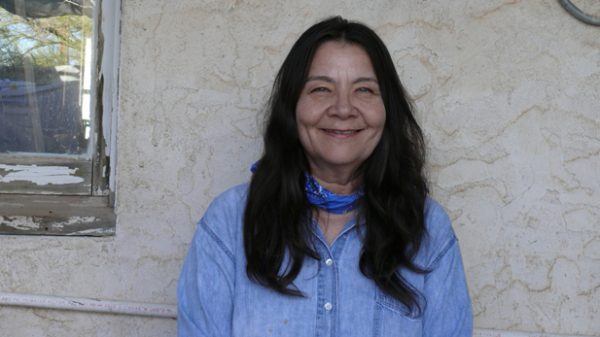
Leslie Marmon Silko is a writer, educator and filmmaker, and someone who has helped influence the Native American Renaissance.
Silko was born in 1948 in Albuquerque, New Mexico. Her identity as ¼ Laguna Pueblo influenced her childhood. She grew up on the edge of the Laguna Pueblo reservation but was unable to participate in some of the ritual, due to their distance. But she did grow up hearing the traditional stories of the Laguna people, learning more about her Laguna ancestry. As she explained in an interview with Alan Velie, “I am of mixed-breed ancestry, but what I know is Laguna.”
In 1969, she graduated from the University of New Mexico with her B.A. and attended their law school for a brief period of time before pursuing her writing career.
Silko’s first publication was a short story titled “The Man to Send Rain Clouds,” which won a National Endowment for the Humanities Discovery Grant. Following that story, she published a collection of poetry called Laguna Woman: Poems (1974). Her first novel was Ceremony, published in 1977.
As she explained about her first novel in an interview, “Something in writing Ceremony that I had to discover for myself was indeed that the old stories still have in their deepest level a content that can give the individual a possibility to understand.”
Silko won the MacArthur Foundation Grant in 1981 and the Native Writers’ Circle of the Americas Lifetime Achievement Award in 1994.
In the years following the publication of Ceremony, Silko worked on her 1991 novel Almanac of the Dead. This novel, as explained by Publisher’s Weekly, “is an impassioned indictment of the white man’s rule in the Americas, a prophecy of a revolution by Native Americans, and a jeremiad warning of a corrupt world rushing to Armageddon.” This novel is over 700 pages, providing an extensive history, almanac, of Native Americans in Tucson and Mexico.
In 2010, Silko’s memoir The Turquoise Ledge was released. As reviewed by the Washington Post, her memoir “recount[s] moments that many desert dwellers will instantly recognize: the near-ecstasy that comes when a cloud decides to open up and spatter a little rain on the ground, the feel of shuddering summer heat on the skin.”
Silko has brought a voice to many Native Americans, and continues to use her writing as a way to carry their different cultures.
P.S. We think Leslie Marmon Silko is so great, we also profiled her during Women’s History Month.